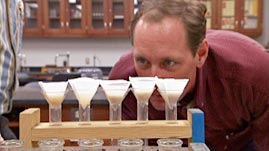Teachers' Domain - Digital Media for the Classroom and Professional Development
User: Preview


Source: Pathways to Technology: "Precision Agriculture Student Profile: Richard Guider"
In this video adapted from Pathways to Technology, learn how one person turned a job-ending injury into an opportunity to build a new career. When Richard Guider lost his arm in an industrial accident, he needed to find new career opportunities. He began by attending community college, where he studied agricultural technology and water management. In school, he learned that a job can be more than just a way to earn a paycheck—it can help make a difference in the world, for example, by keeping the fishing holes he loves free of pollution.
Richard Guider had a job as a factory worker on an assembly line, and figured that’s where he would stay, since he never went to college. Then he suffered an industrial accident that cost him his left arm and his job, and forced him to change his life.
Richard went to community college where he became interested in agricultural technology, geographic information systems (GIS), and global positioning systems (GPS). GIS takes information from tools like sonar and GPS systems, and creates detailed, layered maps of locations and environments. In agricultural industries, GIS and GPS can provide data to farmers about, for example, how to grow the crops best suited to a given patch of soil. GPS and GIS are vital tools in every industry connected to land and ocean environments, from resource management to communication.
Through his studies, Richard discovered an interest in monitoring water quality and contamination levels. As a longtime fisherman, he always knew where water pollution levels were high, but he didn’t know why. “I love to go fishing, and I wanted to pursue a career where I could apply my high-tech skills to protect the environment,” says Richard.
In Richard's precision farming course, agriculture and technology came together. Farming is no longer just “cows, sows, and plows”—it’s a management system in which data on crops, water, chemicals, and soil must be gathered and processed in order to make better decisions.
"Community college has given me the opportunity to select a career which I feel is very beneficial," says Richard. “Now I’m doing something that I want to do, instead of doing something just for a paycheck. It’s changed my life a lot; it’s opened my mind up. I believe that with the proper education, and maybe a little bit of luck here and there, that one can go out and make a difference.”
 Loading Standards
Loading Standards